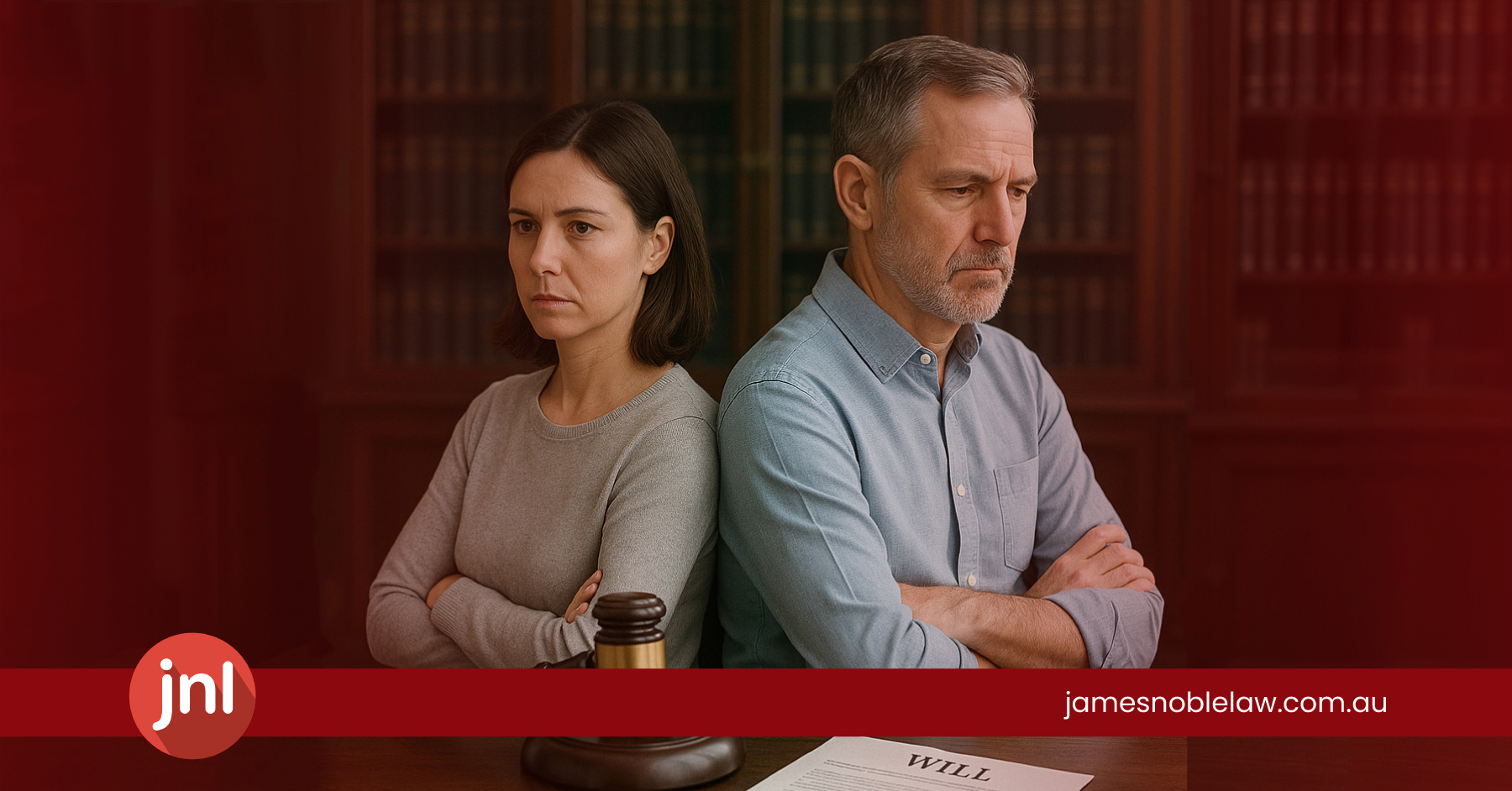Can a Binding Financial Agreement Be Overturned? Here’s What You Need to Know
Binding Financial Agreements (BFAs), commonly known as prenups or financial separation agreements, are legal documents designed to give couples clarity and certainty when it comes to managing their assets and finances in the event of separation or divorce. But what happens if one party feels the agreement was unfairly made? Can a BFA be challenged or set aside by the Court? The answer is yes, but under extremely specific circumstances. In this article, we’ll break down when and how a...
Read More
Untying the Knot: Top Divorce Questions in Queensland — Answered by James Noble Law
When facing a divorce, it's completely normal to feel overwhelmed, confused, and even a little lost. In Queensland, the legal process can seem complicated without the right guidance. Thankfully, James Noble Law, one of Brisbane's most respected family law firms, is here to simplify things. Here are some of the most commonly asked questions about divorce in Queensland, along with how the team at James Noble Law expertly addresses each concern. 1. How long do I have to be separated...
Read More
Why You Should Draft a New Will After Divorce and Property Settlement in Queensland
What happens to my will after a divorce?” and “Do I need to update my will after my divorce?” are questions we often receive at James Noble Law. As Divorce is such a life-altering event—emotionally, financially, and legally – it is easy to overlook a crucial step: updating your Will. In Queensland, the law makes certain automatic changes to your Will following divorce—but it doesn’t go far enough. Failing to revise your estate planning documents can lead to unintended outcomes,...
Read More
Understanding Separate Asset Pool Division in Family Law Property Settlements
When a relationship breaks down, dividing property and finances can be one of the most complex and emotionally charged aspects of separation. Questions our Family Law Firm are often asked include: “What happens to my assets that were mine before the relationship?”, “What happens if I have made greater contributions to the asset pool prior to separation?” , and “Is my ex-partner entitled to my assets even if we had a short relationship?”. This is where the concept of separate...
Read More
Understanding No-Fault Divorce in Australia: The Court’s Perspective on Affairs, Infidelity, and Family Violence
No Need to Prove Fault for Divorce [caption id="attachment_18170" align="alignright" width="350"] No fault divorce[/caption] Despite what you may see on television shows, movies or in the media, there is no need to prove that a party to a marriage was ‘at fault’ for a relationship breakdown. It is a common misconception that if one party’s behaviour contributes to the relationship breakdown, the other spouse will receive a more favourable outcome in the property settlement or parenting arrangements. Put simply, the...
Read More
Overview of divorce proceedings in Australia
Am I eligible to commence divorce proceedings? [caption id="attachment_17912" align="alignright" width="350"] divorce proceedings in Australia[/caption] Divorce proceedings can be initiated in Australia if either you or your spouse: is an Australian citizen; is domiciled in Australia; or has been ordinarily resident in Australia for the past three years. For the purposes of family law proceedings in Australia, ‘ordinarily resident’ means that someone has voluntarily chosen to live in Australia for a settled purpose. If there is a relationship breakdown, you...
Read More
The Divorce Process in QLD: Step-By-Step guidance to help Demystify the process
The experience of going through a divorce can feel stressful and overwhelming for many couples. For these reasons, the divorce process in QLD is designed to be as straightforward as possible. To illustrate that the process is not as daunting as it may seem, we have created a step-by-step guide to help you and your spouse navigate the process successfully. BEFORE YOU FILE A DIVORCE APPLICATION, CONSIDER THE FOLLOWING ISSUES [caption id="attachment_17716" align="alignright" width="350"] Divorce Process in QLD[/caption] What type...
Read More
Navigating the Divorce Process in QLD: A Step-by-Step Guide
THE PROCESS OF DIVORCE IN QLD: STEP-BY-STEP GUIDANCE TO HELP DEMYSTIFY THE PROCESS [caption id="attachment_13405" align="alignright" width="300"] Divorce Process in QLD[/caption] The experience of going through a divorce can feel stressful and overwhelming for many couples. For these reasons, the divorce process in Queensland is designed to be as straightforward as possible. To illustrate that the process is not as daunting as it may seem, we have created a step-by-step guide to help you and your spouse navigate the process...
Read More
Supporting Children Through Separation: Understanding the Psychological Impact
The Psychological Impact of Separation on Children: Offering guidance on how parents can support their children during and after a separation [caption id="attachment_17065" align="alignright" width="300"] Supporting Children Through Separation[/caption] Separation can be devastating for all individuals involved, particularly when there are children in the picture. Extensive social science research demonstrates that the effects of separation upon children can manifest in multiple ways throughout their development. A major life change, such as divorce or a de facto relationship breakdown, can foster...
Read More
How Long Does It Take To Get A Divorce?
How Long Does It Take To Get A Divorce? Before granting a divorce, the Federal Circuit and Family Court of Australia must be satisfied that there is no chance of reconciliation and there is no reasonable chance that the parties will get back together. For this reason, parties must be separated for a period of at least 12 months before applying to get a divorce. Once this period has passed, you may complete an Application for Divorce either solely or...
Read More
Can you use secret audio recordings in family law?
Can you use secret audio recordings in family law? As technology continues to evolve, it is becoming more common for clients to ask whether they can use secret audio recordings in their family law matters. Before you consider recording your conversation with the other party, there are several important factors that you need to consider, including: Whether the recording is legal to make in Queensland; Whether a Court will allow the recording to be used as evidence; and Whether you...
Read More
Divorce and Property Settlement: Can you do one without the other?
Divorce and Property Settlement: Can you do one without the other? It is a common assumption that parties have that you can not reach a financial settlement without being divorced and this is simply not true. For parties to reach a property settlement you and your spouse do not need to be divorced. Securing a divorce and obtaining a property settlement are considered two separate matters for example, a divorce is an Order which is made by the Court which...
Read More
Can You Change Your Child’s Surname With Sole Parental Responsibility?
Change Your Child's Surname Changing a child’s surname post-separation is a common occurrence in family law. The process is relatively straightforward if both parents agree. However, it becomes complicated when one parent wishes to change a child’s surname post-separation and the other parent opposes such change. In parenting matters, the Court must apply a presumption that it is in the best interests of the child for the parents to have equal shared parental responsibility in relation to major long-term issues...
Read More
Separated and Living Under One Roof? Here’s something to Consider
Are you separated under one roof? If you and your partner are contemplating a divorce, you have also most likely considered living separately during the process. Although it is a requirement for you and your partner to be separated for a minimum of 12 months prior to filing an Application for Divorce, there is no requirement for the parties to reside separately after the difficult decision to separate has been made. What is separated under one roof? It is extremely...
Read More
Statutory Time Limits in Property Settlements
Key Time Limits After Divorce and Separation There are two (2) very important Statutory Time Limits in property settlements that are critical for family law matters which clients should be aware of. These are summarised below: After a Divorce Order has been granted, parties have twelve (12) months from the date of the Divorce Order to commence Court proceedings seeking Orders for property settlement and/or spousal maintenance. Following the breakdown of a de facto relationship, parties have twenty-four (24) months from...
Read More
Considering Applying for a Divorce in Australia?
Are you considering applying for a Divorce in Australia? If you and your Husband or Wife have been separated for more than 12 months, then you can apply for a divorce in Australia to end the marriage. If for any period of the 12 months of separation you and your former partner were living together separated under the one roof, then you will need to file an affidavit explaining the circumstances to the Court and confirming that you and your...
Read More
How Australia Introduced ‘No Fault Divorce’ – And Why Our Family Law System is Under Review Again
No-Fault Divorce in Australia For decades, if you wanted a divorce in Australia, you had to prove your spouse was to blame. No-fault divorce was not legal by local law. The grounds ranged from habitual drunkenness to adultery, and many cases involved the use of private investigators. Some couples who privately agreed to separate would even have to stage adulterous trysts for later evidential use in court. This all changed in 1975 with the introduction of "no-fault divorce" and the Family...
Read More
Five Simple Ways To Cut Unnecessary Costs On Your Family Lawyer
As with many professional services sectors, law professionals generally really only sell their time. And, as we all know very well, time is money. So if you are searching for legal advice the family lawyer cost can be higher depending on the expertise level of your attorney. In the interest of saving everyone time (and money), we've compiled a shortlist of items to consider if budget is a factor (and let's face it that it probably is!). Keep these in...
Read More
How To create a Airtight Binding Financial Agreements ? How Tight Is An Airtight BFA?
Preparing an Airtight Binding Financial Agreements Binding Financial Agreements (BFA), also referred to as “pre-nups” are created when two parties have made a fully informed decision to enter into a binding agreement. The creation of an Airtight Binding Financial Agreements requires the parties to disclose their financial position, provide reasonable time to consider the agreement and obtain independent legal representation to avoid any undue influence or pressure on the other party. This document effectively allocates assets and other financial resources...
Read More
Enacting Recovery Orders To Bring Back Your Kids by Parenting plan or Agreement.
What is a Parenting Plan? A parenting plan is a plan which puts the best interests of the child first. It is your and your partner's commitment to your children and their future. A parenting plan is a written agreement between parents under practical issues of parental responsibility. What Happens if a Party breaks Parenting plan or arrangement and Does Not Return the Child? If you are concerned that your child may not be returned to your care after spending...
Read More






















